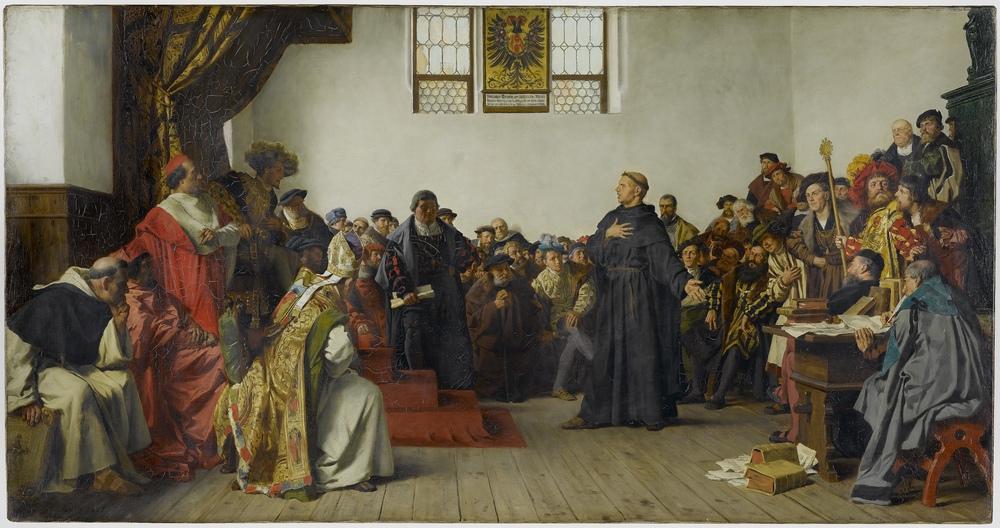The Young Emperor's Confession
Charles V and the Diet of Worms: Part 2 Guest post by Clayton Miles Lehman
Charles dipped pen in ink and began to write.
Martin Luther appeared before Charles V at Worms the day before, refusing to recant. Now, it was time to act. This special guest series by Clayton Miles Lehman continues with part 2 below.

At eight o’clock in the morning of Friday 19 April 1521, Emperor Charles V entered the lofty hall of the bishop’s palace in Worms. He normally dined here, in a much smaller room than the large hall where Luther’s second hearing had taken place the day before. Now only the electors and princes and some of the other representatives of the estates of the empire attended. Today a visitor to the spot finds himself outside a garden, for the French destroyed the bishop’s palace along with much of the rest of city in 1689 during the War of the League of Augsburg.
The day before, at Luther’s second hearing, Charles had wanted to accommodate not only the members of the diet but also the crowds who had come to see their hero or nemesis. But today the time had come not to give Luther a chance to demonstrate his outrageous obstinacy and the emperor his mercy and generosity, but to act. Charles asked the princes’ advice about the problem of Martin Luther. They asked for time to reflect. Now Charles sprang his surprise. “Fine,” he said; “I shall, however, first give you my opinion.” He showed them the sheet he held in his hand and had it read, first in French and then in a German translation:
You know that I am descended from the most Christian emperors of the noble German nation, from the Catholic kings of Spain, from the archdukes of Austria, from the dukes of Burgundy, all of whom have been sons of the Roman church faithful to the death. They had always been defenders of the catholic faith, of its sacred ceremonies, decrees, rules, and holy customs for the honor of God, propagation of the faith, and salvation of souls. Since their death they have left to us by natural law and heritage the said sacred catholic observances in order to live and die by their example, and we have lived as true imitators of those our ancestors by the grace of God up to now.
For this just reason I have determined to hold to all that my aforesaid ancestors and I myself have held to up to the present and especially to what was ordered by my aforesaid ancestors at the Council of Constance as well as at other councils. For it is certain that one lone friar errs in his opinion, which contradicts all Christendom as much in the past thousand years and even longer as it does in the present. According to that opinion all said Christendom would be and would always have been in error. Wherefore I am utterly determined in this matter to employ my realms and lordships, my friends, my body, my blood, my life, and my soul. For it would be a great shame for me and for you, who are the noble and renowned nation of Germany, who are singled out by privilege and preeminence to serve as the defenders and protectors of the catholic faith, that in our time not only heresy but even the suspicion of heresy or the diminution of the Christian religion should due to our negligence reside after us in the hearts of men to our perpetual dishonor and that of our successors.
Having heard the obstinate response that Luther gave yesterday in the presence of us all, I declare to you that I regret having hesitated to proceed against the said Luther and his false doctrine, and I am determined not to listen to him any longer. But I intend that forthwith, according to the terms of the order, he be remanded, though honoring the tenor of his safe-conduct, without preaching or admonishing the people about his evil doctrine and without inciting any commotion. And, as I have said before, I am determined to conduct myself and proceed against him as against a notorious heretic. I ask you to declare yourselves in this affair as good Christians and hold to it and do as you have promised. Made by my hand this 19 April 1521. Signed: Charles.
As they listened his audience turned white as death—so reported the papal nuncios Hieronymus Aleander and Marino Caracciolo. Then the princes applauded his sentiment.
Part 1 "The Emperor and the Monk"
Part 2 "The Young Emperor's Confession"
Part 3 "The Young Emperor Comes into His Own"
Part 4 "Politics, the French, and the Turks"
Part 5 "Imperial Reforms at the Diet of Worms"
Part 6 "The Edict that Brought No Resolution"
Read part 1 here, or find more on the Protestant Reformation in Christian History magazine here.
Clayton Lehmann is Professor of History at the University of South Dakota. He has taught and published widely in the history of ancient Greece and Rome and the Early Modern period and in the field of classical reception. His current book project is a critical translation of López de Gómera’s Historia general de las Indias (1552-1555).



